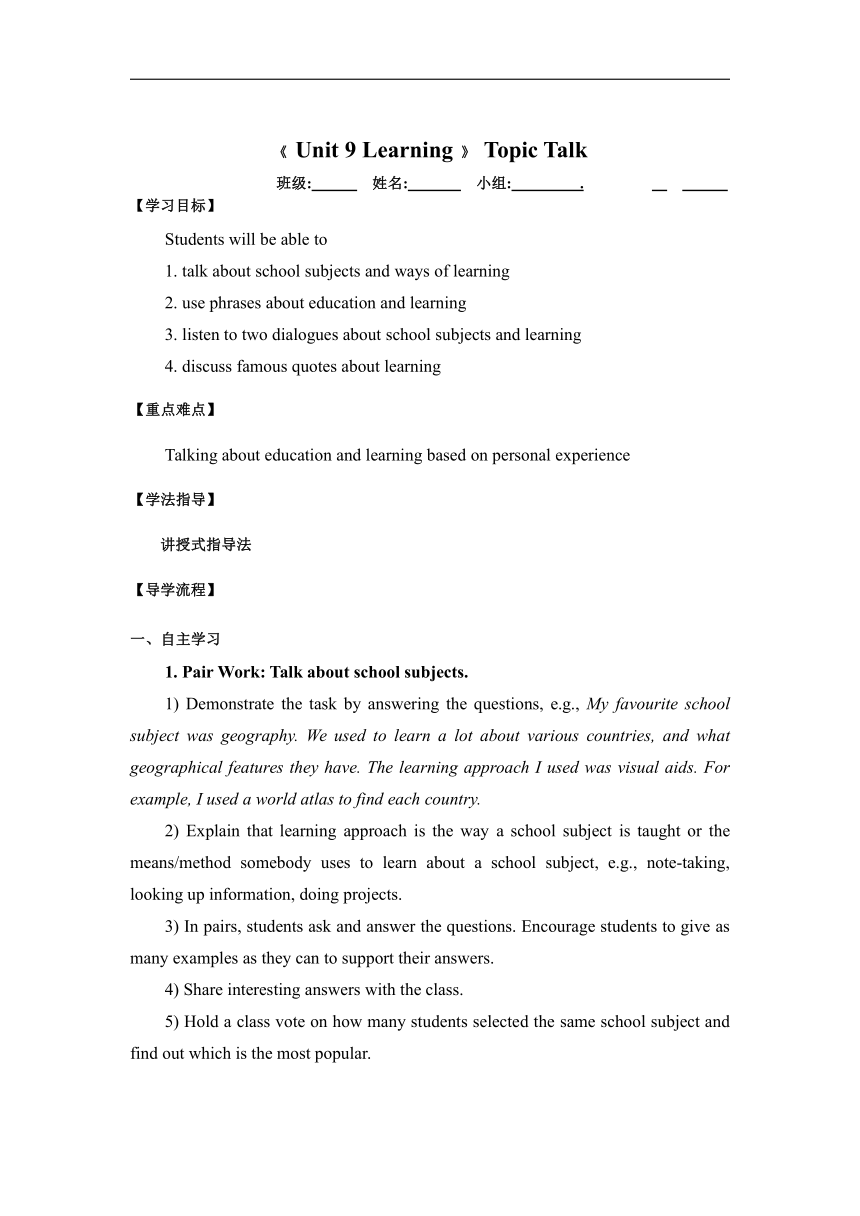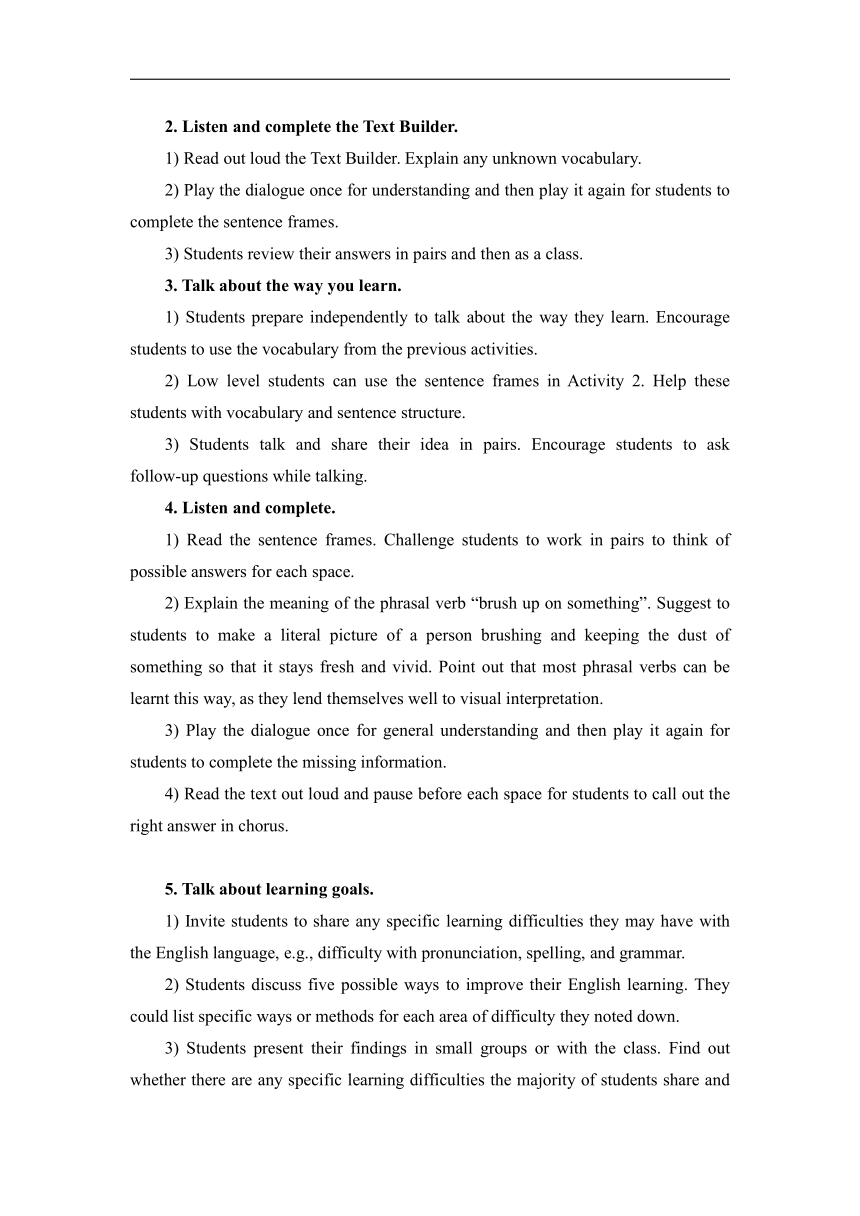北师大版(2019)必修第三册Unit 9 Learning Topic Talk学案(含答案)
文档属性
| 名称 | 北师大版(2019)必修第三册Unit 9 Learning Topic Talk学案(含答案) |

|
|
| 格式 | doc | ||
| 文件大小 | 34.0KB | ||
| 资源类型 | 教案 | ||
| 版本资源 | 北师大版(2019) | ||
| 科目 | 英语 | ||
| 更新时间 | 2023-05-11 00:00:00 | ||
图片预览


文档简介
《 Unit 9 Learning 》 Topic Talk
班级: 姓名: 小组: .
【学习目标】
Students will be able to
1. talk about school subjects and ways of learning
2. use phrases about education and learning
3. listen to two dialogues about school subjects and learning
4. discuss famous quotes about learning
【重点难点】
Talking about education and learning based on personal experience
【学法指导】
讲授式指导法
【导学流程】
一、自主学习
1. Pair Work: Talk about school subjects.
1) Demonstrate the task by answering the questions, e.g., My favourite school subject was geography. We used to learn a lot about various countries, and what geographical features they have. The learning approach I used was visual aids. For example, I used a world atlas to find each country.
2) Explain that learning approach is the way a school subject is taught or the means/method somebody uses to learn about a school subject, e.g., note-taking, looking up information, doing projects.
3) In pairs, students ask and answer the questions. Encourage students to give as many examples as they can to support their answers.
4) Share interesting answers with the class.
5) Hold a class vote on how many students selected the same school subject and find out which is the most popular.
2. Listen and complete the Text Builder.
1) Read out loud the Text Builder. Explain any unknown vocabulary.
2) Play the dialogue once for understanding and then play it again for students to complete the sentence frames.
3) Students review their answers in pairs and then as a class.
3. Talk about the way you learn.
1) Students prepare independently to talk about the way they learn. Encourage students to use the vocabulary from the previous activities.
2) Low level students can use the sentence frames in Activity 2. Help these students with vocabulary and sentence structure.
3) Students talk and share their idea in pairs. Encourage students to ask follow-up questions while talking.
4. Listen and complete.
1) Read the sentence frames. Challenge students to work in pairs to think of possible answers for each space.
2) Explain the meaning of the phrasal verb “brush up on something”. Suggest to students to make a literal picture of a person brushing and keeping the dust of something so that it stays fresh and vivid. Point out that most phrasal verbs can be learnt this way, as they lend themselves well to visual interpretation.
3) Play the dialogue once for general understanding and then play it again for students to complete the missing information.
4) Read the text out loud and pause before each space for students to call out the right answer in chorus.
5. Talk about learning goals.
1) Invite students to share any specific learning difficulties they may have with the English language, e.g., difficulty with pronunciation, spelling, and grammar.
2) Students discuss five possible ways to improve their English learning. They could list specific ways or methods for each area of difficulty they noted down.
3) Students present their findings in small groups or with the class. Find out whether there are any specific learning difficulties the majority of students share and how these can be tackled.
二、归纳总结
重点句型:
My favorite subject is...
I like to ... after class.
My learning goal is to...
三、针对训练
1. 根据要求写出对应汉语意思和词性
(1)
(2)Chinese _______________
(3)Math _______________
(4)English _______________
(5)Chemistry _______________
(6)History _______________
(7)Physics _______________
(8)Art _______________
(9)Geography _______________
(10)Biology _______________
(11)Music _______________
【堂测堂练】
写出下列单词及其拓展词汇
1.reflect vi.&vt.思考;映射;反射;思考→reflection n.反射;反映;映像
2.argue vi.争论→argument n.争吵,争论
3.promote v.促进,增进;晋升,提升→promotion n.晋级;增进
4.unlikely adj.不可能的→likely adj.可能的
5.exist vi.存在;生存→existence n.存在;生存
6.ignore v.忽视;不理;不管→ignorance n.无知;愚昧→ignorant adj.愚昧的,无知的
7.impression n.印象→impress vt.使印象深刻;使铭记→impressive adj.给人深刻印象的;感人的
班级: 姓名: 小组: .
【学习目标】
Students will be able to
1. talk about school subjects and ways of learning
2. use phrases about education and learning
3. listen to two dialogues about school subjects and learning
4. discuss famous quotes about learning
【重点难点】
Talking about education and learning based on personal experience
【学法指导】
讲授式指导法
【导学流程】
一、自主学习
1. Pair Work: Talk about school subjects.
1) Demonstrate the task by answering the questions, e.g., My favourite school subject was geography. We used to learn a lot about various countries, and what geographical features they have. The learning approach I used was visual aids. For example, I used a world atlas to find each country.
2) Explain that learning approach is the way a school subject is taught or the means/method somebody uses to learn about a school subject, e.g., note-taking, looking up information, doing projects.
3) In pairs, students ask and answer the questions. Encourage students to give as many examples as they can to support their answers.
4) Share interesting answers with the class.
5) Hold a class vote on how many students selected the same school subject and find out which is the most popular.
2. Listen and complete the Text Builder.
1) Read out loud the Text Builder. Explain any unknown vocabulary.
2) Play the dialogue once for understanding and then play it again for students to complete the sentence frames.
3) Students review their answers in pairs and then as a class.
3. Talk about the way you learn.
1) Students prepare independently to talk about the way they learn. Encourage students to use the vocabulary from the previous activities.
2) Low level students can use the sentence frames in Activity 2. Help these students with vocabulary and sentence structure.
3) Students talk and share their idea in pairs. Encourage students to ask follow-up questions while talking.
4. Listen and complete.
1) Read the sentence frames. Challenge students to work in pairs to think of possible answers for each space.
2) Explain the meaning of the phrasal verb “brush up on something”. Suggest to students to make a literal picture of a person brushing and keeping the dust of something so that it stays fresh and vivid. Point out that most phrasal verbs can be learnt this way, as they lend themselves well to visual interpretation.
3) Play the dialogue once for general understanding and then play it again for students to complete the missing information.
4) Read the text out loud and pause before each space for students to call out the right answer in chorus.
5. Talk about learning goals.
1) Invite students to share any specific learning difficulties they may have with the English language, e.g., difficulty with pronunciation, spelling, and grammar.
2) Students discuss five possible ways to improve their English learning. They could list specific ways or methods for each area of difficulty they noted down.
3) Students present their findings in small groups or with the class. Find out whether there are any specific learning difficulties the majority of students share and how these can be tackled.
二、归纳总结
重点句型:
My favorite subject is...
I like to ... after class.
My learning goal is to...
三、针对训练
1. 根据要求写出对应汉语意思和词性
(1)
(2)Chinese _______________
(3)Math _______________
(4)English _______________
(5)Chemistry _______________
(6)History _______________
(7)Physics _______________
(8)Art _______________
(9)Geography _______________
(10)Biology _______________
(11)Music _______________
【堂测堂练】
写出下列单词及其拓展词汇
1.reflect vi.&vt.思考;映射;反射;思考→reflection n.反射;反映;映像
2.argue vi.争论→argument n.争吵,争论
3.promote v.促进,增进;晋升,提升→promotion n.晋级;增进
4.unlikely adj.不可能的→likely adj.可能的
5.exist vi.存在;生存→existence n.存在;生存
6.ignore v.忽视;不理;不管→ignorance n.无知;愚昧→ignorant adj.愚昧的,无知的
7.impression n.印象→impress vt.使印象深刻;使铭记→impressive adj.给人深刻印象的;感人的
同课章节目录
- Unit 7 Art
- Lesson 1 Masterpieces
- Lesson 2 Beijing Opera
- Lesson 3 A Musical Genius
- Unit 8 Green living
- Lesson 1 Roots and Shoots
- Lesson 2 Greening the Desert
- Lesson 3 "White Bikes" on the Road
- Unit 9 Learning
- Lesson 1 Active Learning
- Lesson 2 Language Learning Tips
- Lesson 3 The Secrets of Your Memory
